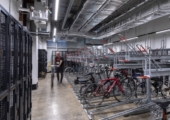January 7, 2019
Firms and their workers need to adapt more quickly to changing world of work
 Governments need to do more to help workers and firms adapt to the fast-changing world of work and drive inclusive growth, according to the new OECD Jobs Strategy. New evidence in the report claims that countries that promote job quantity, quality and inclusiveness – such as Denmark, Iceland, Norway and Sweden – perform better than those which focus predominantly on market flexibility. While flexibility and adaptability are essential to stimulate the creation of high-quality jobs in an ever more dynamic environment, the gains and costs need to be fairly shared between businesses and workers, according to the OECD.
Governments need to do more to help workers and firms adapt to the fast-changing world of work and drive inclusive growth, according to the new OECD Jobs Strategy. New evidence in the report claims that countries that promote job quantity, quality and inclusiveness – such as Denmark, Iceland, Norway and Sweden – perform better than those which focus predominantly on market flexibility. While flexibility and adaptability are essential to stimulate the creation of high-quality jobs in an ever more dynamic environment, the gains and costs need to be fairly shared between businesses and workers, according to the OECD.











 Over half of workers (53 percent) believe that getting the right people with the right skills will be the biggest issue faced by their workplace in the year ahead. This is according to research published by Acas today, which commissioned YouGov to find out what UK employees identified as the most important workplace issues in the year ahead. The other two top issues identified were technological change (36 percent) and productivity (36 percent). Other issues identified by participants in the poll included fit and healthy staff (18 percent) and Equality and Fairness (17 percent). Acas Chief Exec, Susan Clews, said: “Employees feel that getting workers with the right skills is a key concern in the year ahead. This could be attributed to uncertainty around our relationship with the EU at the moment or general concerns around skills shortages.
Over half of workers (53 percent) believe that getting the right people with the right skills will be the biggest issue faced by their workplace in the year ahead. This is according to research published by Acas today, which commissioned YouGov to find out what UK employees identified as the most important workplace issues in the year ahead. The other two top issues identified were technological change (36 percent) and productivity (36 percent). Other issues identified by participants in the poll included fit and healthy staff (18 percent) and Equality and Fairness (17 percent). Acas Chief Exec, Susan Clews, said: “Employees feel that getting workers with the right skills is a key concern in the year ahead. This could be attributed to uncertainty around our relationship with the EU at the moment or general concerns around skills shortages.


 Just three days into the New Year, today (Friday 4 January), the UK’s top bosses will have made more than a typical full-time worker will earn in the entire year, according to calculations from independent think tank the High Pay Centre and the CIPD. The average (median) full-time worker in the UK earns a gross annual salary of £29,574, while the average FTSE 100 CEO, on an average (median) pay packet of £3.9 million, only needs to work until 1pm on Friday 4 January 2019 to earn the same amount. The £3.9 million figure was calculated by the CIPD and the High Pay Centre in their
Just three days into the New Year, today (Friday 4 January), the UK’s top bosses will have made more than a typical full-time worker will earn in the entire year, according to calculations from independent think tank the High Pay Centre and the CIPD. The average (median) full-time worker in the UK earns a gross annual salary of £29,574, while the average FTSE 100 CEO, on an average (median) pay packet of £3.9 million, only needs to work until 1pm on Friday 4 January 2019 to earn the same amount. The £3.9 million figure was calculated by the CIPD and the High Pay Centre in their 
 Office investment volume in Central London in 2018 is expected to come close to £20 billion, despite the ongoing economic and political uncertainties of Brexit. According to Savills London witnessed notably above average levels of office take-up in 2018 and achieved the best ever City of London rent (£80 per sq ft). The list of global businesses committing to long term leases has continued to grow with announcements in the last 12 months from Facebook, LinkedIn and Sidley Austin. The constrained development pipeline has seen more office pre-lets over 50,000 sq ft agreed in 2018 than ever before, while a shortage of available Grade A options has matured into a greater number of development opportunities. Savills also predicts a greater number of value-add and development opportunities coming to the market and that trading in London will insure the ongoing creation of the world’s best office buildings in a city where people will continue to want to work. This in turn creates new investment opportunities for global investors searching for prime assets.
Office investment volume in Central London in 2018 is expected to come close to £20 billion, despite the ongoing economic and political uncertainties of Brexit. According to Savills London witnessed notably above average levels of office take-up in 2018 and achieved the best ever City of London rent (£80 per sq ft). The list of global businesses committing to long term leases has continued to grow with announcements in the last 12 months from Facebook, LinkedIn and Sidley Austin. The constrained development pipeline has seen more office pre-lets over 50,000 sq ft agreed in 2018 than ever before, while a shortage of available Grade A options has matured into a greater number of development opportunities. Savills also predicts a greater number of value-add and development opportunities coming to the market and that trading in London will insure the ongoing creation of the world’s best office buildings in a city where people will continue to want to work. This in turn creates new investment opportunities for global investors searching for prime assets.















January 7, 2019
What Leonardo da Vinci can teach us about the six hour working day 0
by Mark Eltringham • Comment, Flexible working, Technology, Wellbeing
More →